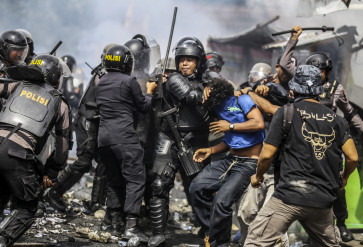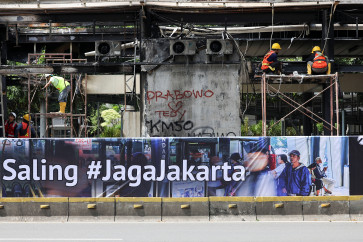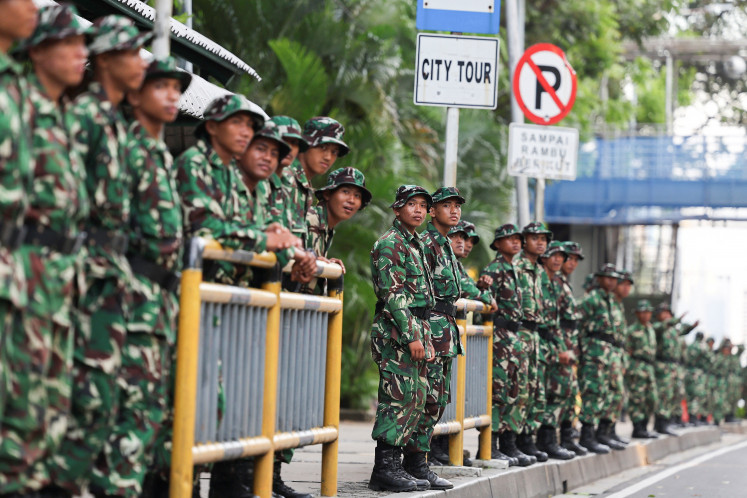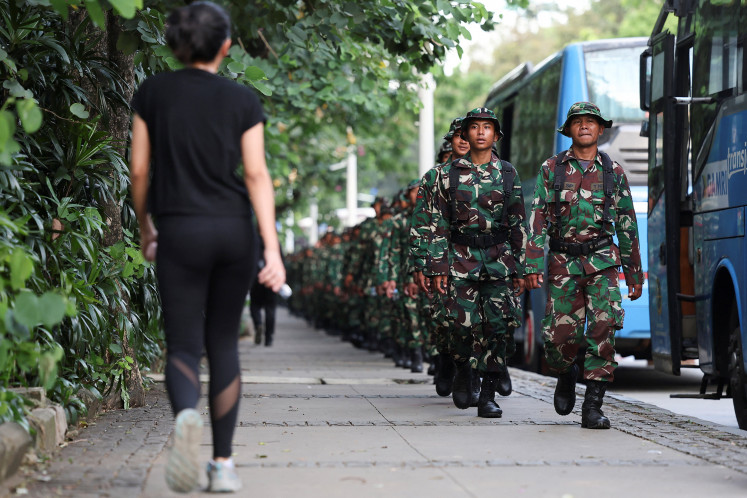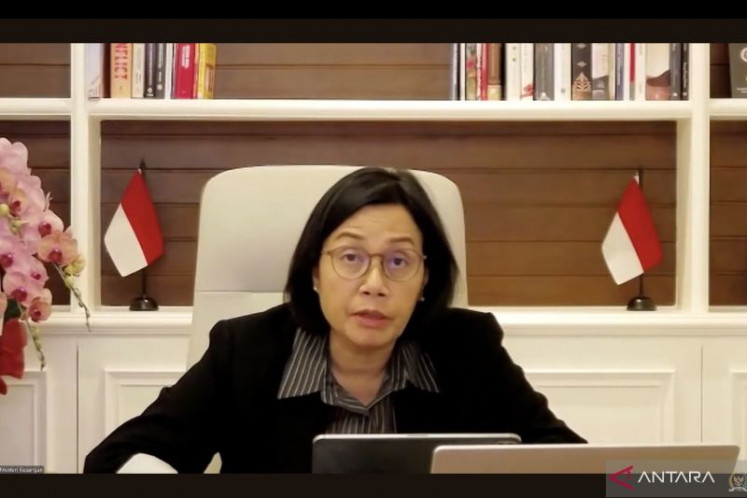Popular Reads
Top Results
Can't find what you're looking for?
View all search resultsPopular Reads
Top Results
Can't find what you're looking for?
View all search resultsJapanese PM re-elected party leader, despite waning popularity
Japanese Prime Minister Shinzo Abe (center) reacts to his supporting lawmakers as Abe runs for the ruling Liberal Democratic Party (LDP) presidential election in Tokyo on Tuesday
Change text size
Gift Premium Articles
to Anyone
 Japanese Prime Minister Shinzo Abe (center) reacts to his supporting lawmakers as Abe runs for the ruling Liberal Democratic Party (LDP) presidential election in Tokyo on Tuesday. Abe extended his term as party leader, putting himself potentially on course to the longest-serving premier in Japanese politics in decades. (AFP/JIJI Press) (center) reacts to his supporting lawmakers as Abe runs for the ruling Liberal Democratic Party (LDP) presidential election in Tokyo on Tuesday. Abe extended his term as party leader, putting himself potentially on course to the longest-serving premier in Japanese politics in decades. (AFP/JIJI Press)
Japanese Prime Minister Shinzo Abe (center) reacts to his supporting lawmakers as Abe runs for the ruling Liberal Democratic Party (LDP) presidential election in Tokyo on Tuesday. Abe extended his term as party leader, putting himself potentially on course to the longest-serving premier in Japanese politics in decades. (AFP/JIJI Press) (center) reacts to his supporting lawmakers as Abe runs for the ruling Liberal Democratic Party (LDP) presidential election in Tokyo on Tuesday. Abe extended his term as party leader, putting himself potentially on course to the longest-serving premier in Japanese politics in decades. (AFP/JIJI Press)
J
span class="caption">Japanese Prime Minister Shinzo Abe (center) reacts to his supporting lawmakers as Abe runs for the ruling Liberal Democratic Party (LDP) presidential election in Tokyo on Tuesday. Abe extended his term as party leader, putting himself potentially on course to the longest-serving premier in Japanese politics in decades. (AFP/JIJI Press)
Japanese premier Shinzo Abe was on Tuesday re-elected head of the ruling Liberal Democratic Party, despite falling popularity over efforts to expand the military's role and a stuttering economy.
The 60-year-old conservative, who swept to power in late 2012, ran unopposed in the leadership election, which is held as a matter of course every three years.
Following the vote, the prime minister vowed to press on with his plan to fix the economy and said his Abenomics growth blitz was only "halfway" done.
But the remarks came just hours after revised GDP figures showed the economy shrank 0.3 percent last quarter, underscoring how his efforts to conquer years of deflation and laggardly growth have stumbled.
"Employment and incomes are both getting stronger. The remaining [task] is to keep this virtuous economic cycle going so people feel that a recovery in under way and that the exit from deflation will drive future economic growth," Abe said ahead of Tuesday's vote.
If he holds on to power until September 2018, Abe will become Japan's longest-serving prime minister since Eisaku Sato, who served between 1967 and 1974.
Abe served as premier for just one year from 2006 before he stepped down owing to ill health and a series of scandals in his party, setting off a string of short-lasting leaders until his re-election in late 2012.
But Abe is again facing declining popularity as public opposition swells over security bills that could put Japanese troops into combat for the first time since the end of the war.
He faces upper house elections next year, and he may decide to call a snap general election sometime between now and when his fresh three-year term expires.
Abe's first major re-election challenge will be ramming the unpopular security bills through parliament, possibly as early as next week.
The changes have set off protests by tens of thousands of people and even a hunger strike by a group of Tokyo university students.
Under the proposed new rules, Japan's Self-Defense Forces could go into battle to protect allies -- so-called collective self-defense.
Critics argue that they could drag Japan into distant foreign wars even if there was no direct threat to the country or its people.
Abe and his supporters say the bills are necessary to deal with a changing security environment marked by an increasingly assertive China and unpredictable North Korea.
A constitution imposed by occupying US forces after World War II barred Japan's military from combat except in self-defense.(++++)

